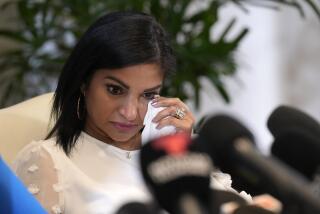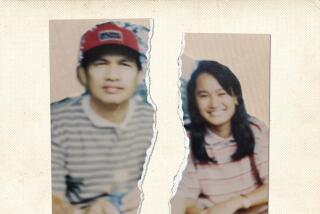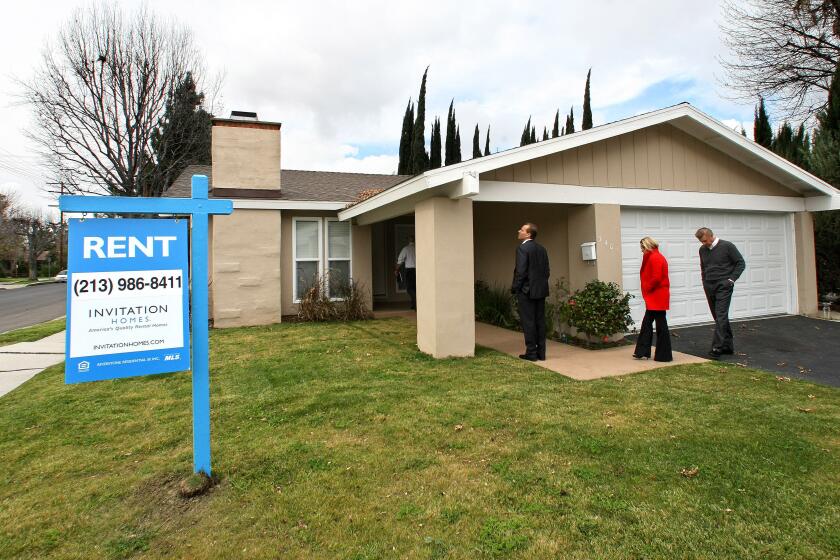BLESS THIS CHURCH
Andre Hensley was pacing the sidewalk, flustered, when I showed up for the annual convention of the religious order founded by his late father. Hensley, a fleshy, focused man of 49, was in pleated khakis and a blue shirt and tie, his receding hair combed back off a broad forehead.
Considering that the 48-year-old Universal Life Church lists millions of members on its rolls, I expected at least some kind of crowd outside its world headquarters, a simple white-clapboard church on a leafy residential street in the San Joaquin Valley city of Modesto. Maybe traffic or confusion about the start time was holding people up, Hensley muttered as he ushered me into the church office. He offered me orange juice, made a few phone calls and went out to survey the street, where ranchera music drifted from the windows of shabby bungalows. When, with evident resignation, he finally led me into the church, a grand total of four people were in the rows of padded metal chairs facing the pulpit.
Perhaps two dozen more would drift through the church over the weekend. Though few in number, the attendees were abundant in spiritual diversity. There was Brother Don Manor, a balding flower wholesaler from San Marcos who had at various times followed Catholicism, Buddhism and Judaism and who used his turn at the pulpit to give a full-throated sermon denouncing the Bible as “a guide that is totally out of date.” There was Minister Shirley Broussard of Long Beach, who has been hearing the voice of God and foreseeing the future since she was 7. There was a telephone faith healer from Florida and a pretty blond dancer who proselytizes to her Hollywood peers, “all the people with breast implants and butt implants and facial surgery, because they’ll listen to someone who’s like them.”
Midway through the morning, a man with long stringy hair and an enormous beard wheeled a little red motor up to the pulpit. “Most of you have probably heard about the 200-mile-per-gallon carburetors,” he began without preamble. Hensley nodded supportively from the front row as the man explained how this device could power an entire house and how we too could build one with materials available at any auto parts store.
This is my church.
My marriage was consecrated by a minister of this faith. In fact, I’m a ULC minister myself. So are my wife, several friends and as many as 20 million other people, including “Survivor” host Jeff Probst, Nicole Richie and Courtney Love. The Universal Life Church is a legally recognized religion that ordains anyone--absolutely anyone. You go to its website, type in your name and basic contact information, and a few days later you receive a certificate in the mail confirming that, boom, you’re a minister. It costs nothing, and the church’s formal doctrine is easy to master. It consists of this sentence: “Do only that which is right.”
The ULC is minting about 10,000 ministers a month, double the volume of just a few years ago, according to Hensley. They’re ordained so they can become jail pastors, visit hospice patients or gain credibility for their own religious groups. The overwhelming majority--at least 90%, by Hensley’s guess--sign up just for the perk of having the legal authority to officiate at a wedding.
These days, interfaith marriages are commonplace, as are second marriages. Many couples don’t belong to any formal religious institution. And many want a ceremony tailored to their tastes and personalities. So it’s no surprise that the number of nondenominational officiants, both hired professionals and volunteer amateurs, is booming.
My wedding was performed by a cousin who was ordained by the ULC for the occasion. No offense to the justice of the peace who married my first wife and me in a New York City municipal office, but the second exchange of vows was immeasurably more meaningful. My cousin helped us create a ceremony brimming with affection and intimacy. There were customized blessings interwoven with personal memories, and everyone’s name was pronounced correctly.
A couple of my friends were so impressed that they asked me to marry them the next year. My brother requested my wife preside over his; she’s done four weddings now. Scan the New York Times announcements most any week, and you’ll find a ULC-officiated wedding. Visit wedding websites, and you’ll find dozens of ads for ULC-ordained ministers.
Why not? Why should love need the imprimatur of a civic official or institutional clergy member? Marriage is the celebration of two people freely making one of life’s most important choices; it seems only fitting that they should have the same freedom to choose the person who will concretize that decision. The ULC is religion at its most democratic.
Around noon, Hensley invited the convention’s attendees to the office for a lunch spread of tuna casserole, egg salad and assorted cakes and pies. This large, open space is the portal through which hundreds of people are processed into ministers every day. E-mails, letters and phone calls are answered by a dozen-odd staffers. Family photos and motel-style landscape prints adorn white plaster walls spidered with cracks. Duct tape patches the carpet. Stacks of white envelopes holding ministerial credentials await the mail carrier.
The basement is crammed with more than 60 filing cabinets holding the records of ministers who have been ordained by the church. Although the Internet has spread the ULC gospel far and wide, Hensley stressed that an actual human processes and stores each online application. “You don’t get ordained online,” he insisted. “You can’t be ordained by a computer. Without records, you have no credibility. People say, ‘You’re just giving out certificates.’ I say, ‘Yes, but we also keep records.’”
Hensley admitted that most ULC ministers don’t know a thing about the church besides its Web address. That doesn’t bother him, and it wouldn’t have bothered his father.
Born in 1911 in North Carolina, Kirby Hensley preached in Southern Baptist churches as a young man. Like many Southerners of the time who sought a better life, he moved his family to California, where religious heterodoxy--from the preachings of Aimee Semple McPherson to the People’s Temple to the Kabbalah Centre--has always found a home. Hensley helped establish a few evangelical congregations before an allergy to authority drove him to carve his own path. “The biggest enemy that man has today, in the free world, is the church,” he declaimed in one rambling tract. “All life wants the same things. It wants to be free, it wants food, and it wants sex . . . in that order! That is heaven when you have it and it is hell when you don’t have it.”
In the late 1950s, Hensley began holding Sunday services in his garage. By the time he officially incorporated the Universal Life Church in 1962, he had decided to take the concept one step further. Ads he took out in spirituality magazines said: “Become a Minister--We will ordain you without question, without price and for life.”
“Our goal was to liberate people,” said Lewis Ashmore, who helped Hensley found the ULC and now tends his own church in Tehachapi. “We realized that religious bondage held lots of people who had to compromise their beliefs to be part of a church. The ULC issues ordinations for you to be yourself. It stands between the individual and the state, not the individual and God.”
By the late 1960s, Hensley had handed out enough instant ordinations to attract the amused attention of the press. His church never drew many parishioners in conservative, agribusiness-dominated Modesto, so Hensley traveled the country, preaching with trademark charisma wherever he could get a hearing. Counterculture kids embraced him like a wacky uncle. Soon he was giving ordinations en masse to thousands of college students. The party peaked in 1971 at a three-day ULC-sponsored music festival in Idaho that drew tens of thousands of people. Thirteen-year-old Andre was there, helping out with ordinations.
All the publicity also drew the interest of the IRS, which declared the ULC a money-making racket, not a church, and demanded millions in back taxes.
There were, unquestionably, some tax dodgers among the ranks of ULC-ordained ministers. And there was quite a bit of cash flowing through the church’s headquarters in its heyday: proceeds from the sales of books and fancier certificates, contributions from supporters and dues from affiliated congregations. At one point the ULC owned real estate throughout the state. One IRS agent testified that he had turned up more than $2 million in ULC bank deposits between 1977 and 1980 alone. Hensley’s personal estate was assessed at more than $1.5 million when he died in 1999.
But there was no evidence of profiteering. At the time of his death, Hensley had a 15-year-old Buick and inhabited the same ramshackle yellow house down the street from a landfill that he and his wife, Lida, had shared for decades. After years of legal wrestling, the ULC distanced itself from the obvious cheats and settled with the authorities.
Kirby Hensley’s presence still suffuses the ULC. His printed “signature” appears on every ministerial certificate. He’s still listed as the presiding minister on the church’s outdoor sign. Inside, an oil portrait of Hensley’s merrily pugnacious face hangs on one side of the dais; on the other is a framed photo of him amid flowers, candles and a box of Kleenex.
Two generations of Hensley’s descendants now run the church. (His widow, Lida, succeeded him as the ULC’s president; she passed away in December.) Andre, the new ULC president, oversees the business and legal affairs as well as the Sunday services, at which anyone may speak. Andre’s daughter, his daughter-in-law and her mother work in the office. His wife and son volunteer there. His sister, a nurse in a nearby town, serves on the board.
“I’ve been working here my whole life,” said Andre’s daughter Kalena, a 26-year-old with a pierced eyebrow and a ring through her septum who edits the monthly newsletter. “I learned to read, write and type sitting in this office on my dad’s knee.”
Andre, ordained at 10, strayed from the Modesto congregation for a while as a young man, following his first wife into the Salvation Army. He quotes the Bible fluently, but at the pulpit during the convention, his delivery was less like that of a man moved by the Spirit and more like that of a friendly college professor leading a seminar. “I can’t fill my father’s shoes,” he said later, seated at his office desk. “No one can. I just try to keep it going the best I can.”
Today, for all its popularity, the ULC barely brings in enough money to keep afloat. Andre’s family has health insurance, thanks to his wife’s old job at Foster Farms. They live in a modest three-bedroom brick house on his parents’ two-acre lot. His daughter sleeps in a trailer out back.
The number of people who turn up at the annual conclave has dropped steadily since his father’s death, Andre said. In Kirby’s day, as many as 500 people would come. Andre blames the Web, where the ULC has had a presence for a decade. Since anyone can now connect to the ULC from anywhere at any time, why bother trekking to Modesto?
The empty chairs in the church that day last October pained him. “I’d like to see more people,” he said during his turn at the pulpit. “That’s what I miss about the church. I grew up with that fellowship. Now you just see names on a screen.”
Membership was Topic A at the afternoon session, which featured a few new arrivals, including Andre’s 81-year-old mother. She sat with her chin on her chest, staring through enormous glasses at the floor. Andre led a discussion on whether they should begin traveling the country again to personally connect with congregations and about what they could do to boost their website’s Google rankings. After a half-hour, Lida suddenly piped up.
“Everything the Bible said has come to pass. Heaven is coming down soon, and when it does, everyone will live there, whether they believe it or not,” she declared in a Southern drawl. “All people are God’s children. Jesus didn’t die just for one. He gave his life for all--A-L-L--and I believe with all my heart and soul that all people are going to the heavenly land because of Jesus.” She went on for several minutes, a voice from another time and place. Andre indulged her until she wound down, then steered the conversation back to recruitment tactics. Lida picked at some flaking skin on the back of her hand and eventually fell asleep.
By the end of the convention’s first day, it was just family left. Kalena shared a smoke with her girlfriend on the church’s back steps. Her brother, Josh, arrived with his daughter Delaney to pick up his wife.
“I don’t believe in God or any higher power,” Josh was pleased to tell me. “But I’m a member of this church. I’m even ordained. For me, a good church isn’t about worshipping whoever--it’s about the community to which you belong. The fact that I can have no religion whatsoever and be totally welcome here is fantastic.”
Andre and his wife finished locking up and went outside. There was desultory talk about when they’d all be getting together for dinner and who would be taking Delaney horseback riding the next day. That, of course, would be after she joined her family for Sunday services at the church.
More to Read
Sign up for Essential California
The most important California stories and recommendations in your inbox every morning.
You may occasionally receive promotional content from the Los Angeles Times.










